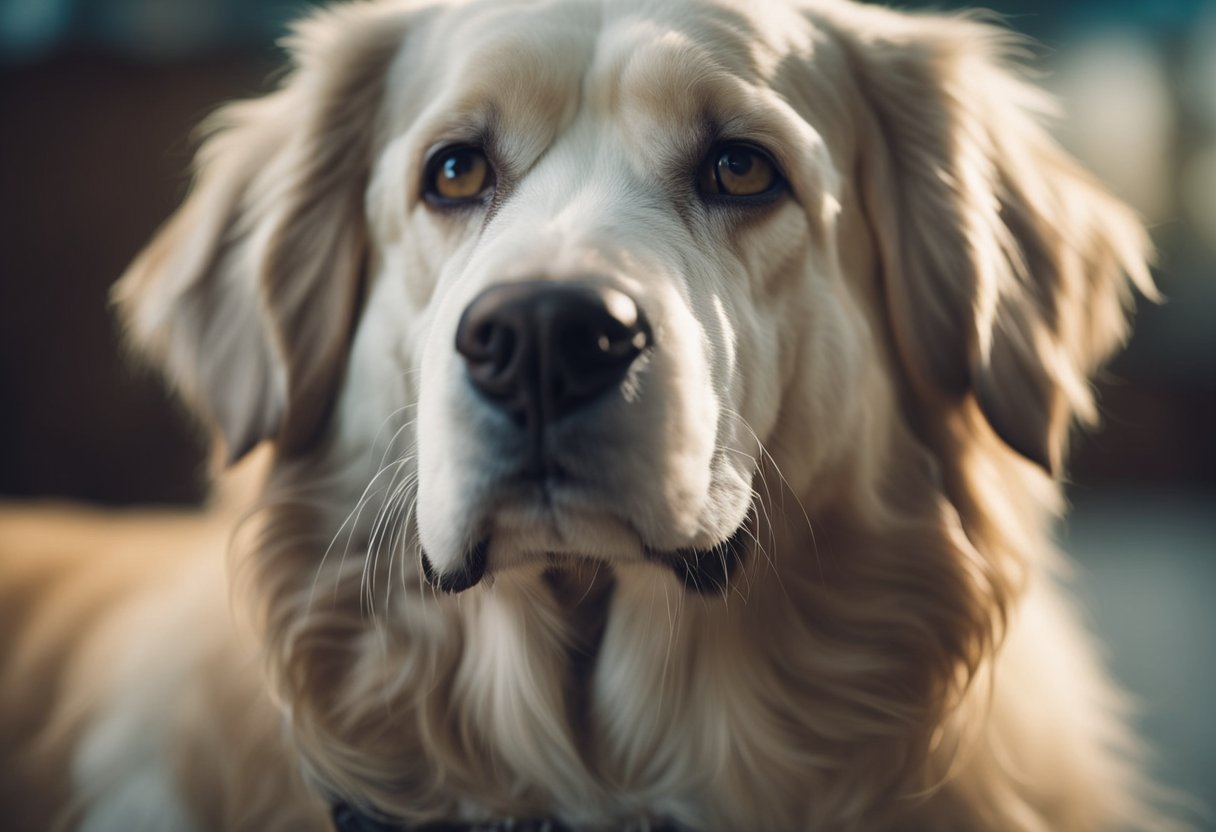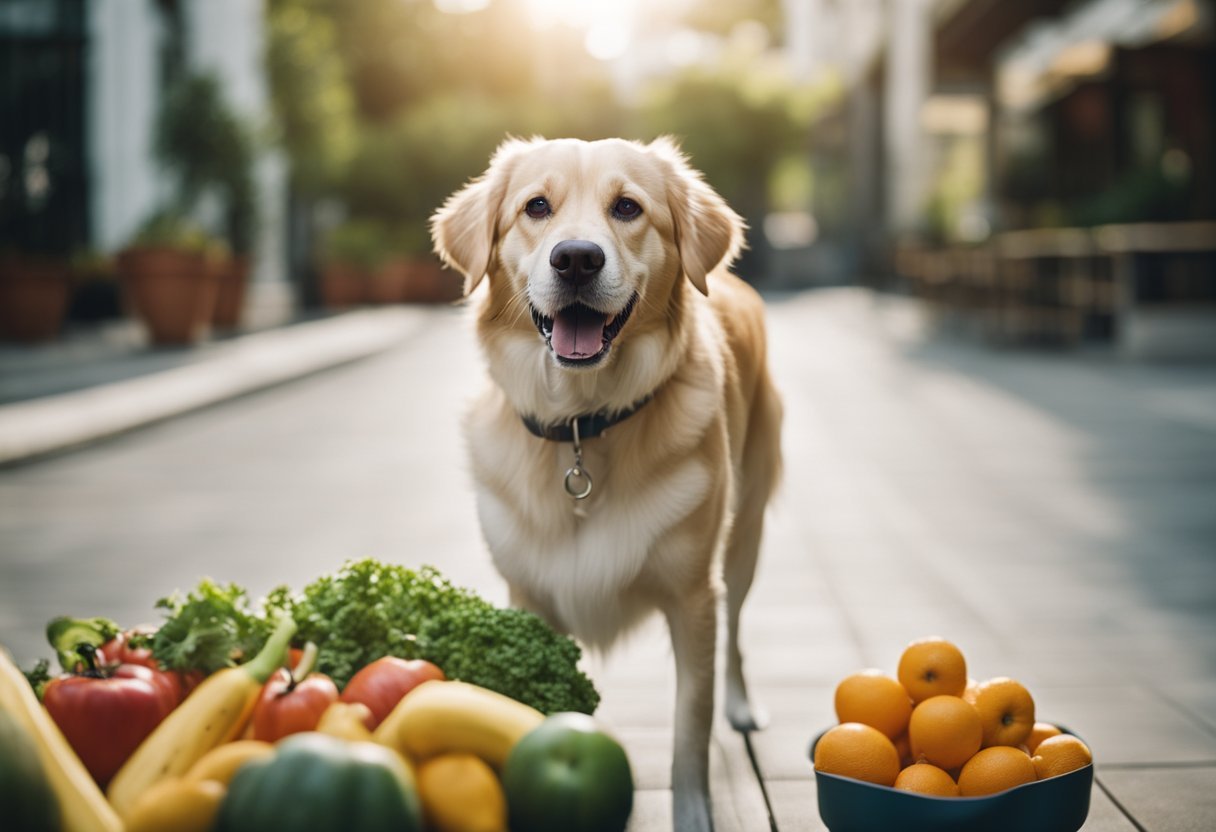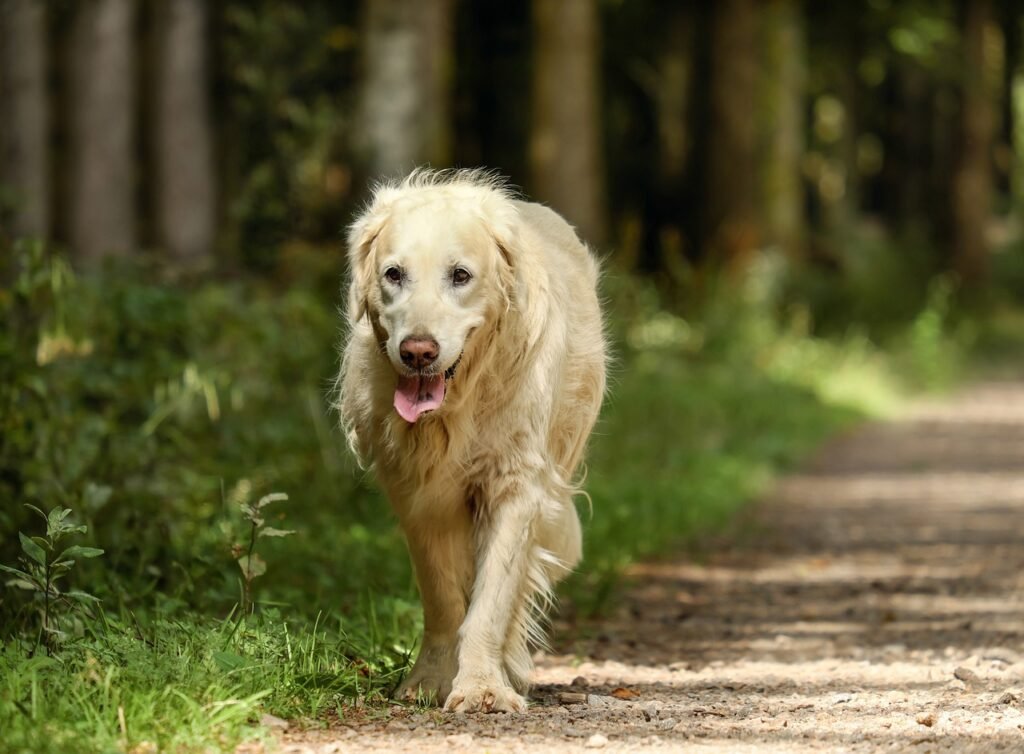Older dogs can be prone to a variety of health issues, and one common symptom that owners may notice is excessive panting. While panting is a natural way for dogs to regulate their body temperature, excessive panting can be a sign of an underlying health problem. Understanding the causes of excessive panting in older dogs can help owners identify potential health issues and seek appropriate treatment.

One common cause of excessive panting in older dogs is pain. As dogs age, they may develop arthritis or other conditions that cause chronic pain. Panting can be a sign that a dog is in pain and may need medication or other treatments to manage their discomfort. Other medical conditions that can cause panting include heart disease, respiratory problems, and hormonal imbalances. In some cases, panting may be a side effect of medication or anesthesia.
Owners should also be aware of environmental factors that can contribute to excessive panting in older dogs. Hot weather, high humidity, and strenuous exercise can all cause a dog to pant excessively. However, if a dog is panting excessively in normal conditions, it may be a sign of an underlying health issue. By monitoring their dog’s behavior and seeking veterinary care when necessary, owners can help ensure that their older dogs stay healthy and comfortable.
Understanding Panting in Old Dogs
Panting is a natural behavior in dogs, especially when they are hot or have been exercising. However, excessive panting in old dogs can be a sign of an underlying health issue. It is important for pet owners to understand the reasons behind old dog panting to ensure their furry friends receive proper care and treatment.
Causes of Excessive Panting in Old Dogs
There are several reasons why an old dog may pant excessively. Some of the most common causes include:
- Pain: Pain is a common cause of increased panting, especially in older dogs. Many dogs develop arthritis or other age-related conditions that cause discomfort, leading to panting.
- Heart disease: Panting in older dogs can be a sign of heart disease, which can lead to inadequate blood flow and oxygen delivery to the body.
- Respiratory problems: Respiratory issues such as chronic bronchitis, pneumonia, or lung cancer can cause panting in dogs.
- Anxiety or stress: Old dogs may pant excessively due to anxiety or stress caused by changes in their environment, such as moving to a new home or the loss of a companion.
- Medications: Some medications can cause panting as a side effect. If an old dog starts panting excessively after starting a new medication, it is important to talk to a veterinarian.
Symptoms of Excessive Panting in Old Dogs
Excessive panting in old dogs can be accompanied by other symptoms that indicate an underlying health issue. Some of the most common symptoms include:
- Heavy breathing at night: Senior dog breathing heavy at night can be a sign of several health issues, including heart problems or respiratory issues.
- Coughing: Persistent coughing, especially if accompanied by panting, warrants concern.
- Seizures: Sudden episodes of seizures paired with panting are an immediate red flag.
- Licking: Excessive licking, particularly of the air or themselves, can be a sign of anxiety or stress.
Conclusion
Old dog panting can be a cause for concern for many pet owners. Understanding the causes and symptoms of excessive panting in old dogs is essential to ensure their furry friends receive proper care and treatment. If an old dog starts panting excessively, it is important to talk to a veterinarian to rule out any underlying health issues.
Common Causes of Panting in Senior Dogs

Panting is a common behavior in dogs, especially when they are hot, excited, or anxious. However, excessive panting in senior dogs can be a sign of an underlying health issue. Here are some of the common causes of panting in senior dogs:
Physical Factors
Physical factors such as obesity, arthritis, and pain can cause panting in senior dogs. Obesity puts extra strain on the heart and lungs, making it harder for the dog to breathe. Arthritis and pain can cause discomfort, making it difficult for the dog to rest and breathe normally.
Environmental Factors
Environmental factors such as heat, humidity, and exercise can cause panting in senior dogs. Dogs regulate their body temperature through panting, and when the temperature or humidity is high, they may pant excessively to cool down. Exercise can also cause panting, especially if the dog is not used to it or has a health condition that makes it difficult to breathe.
Health Conditions
Several health conditions can cause panting in senior dogs. These include:
- Heart disease: Dogs with heart disease may pant excessively due to fluid buildup in the lungs or heart.
- Respiratory disease: Respiratory diseases such as chronic bronchitis, pneumonia, and lung cancer can cause panting in senior dogs.
- Cushing’s disease: Cushing’s disease is a hormonal disorder that can cause excessive panting, among other symptoms.
- Pain and discomfort: Pain and discomfort from various health conditions can cause panting in senior dogs.
- Anxiety and stress: Anxiety and stress can cause panting in dogs, especially if they are left alone for long periods or experience changes in their environment.
It is important to note that excessive panting in senior dogs can be a sign of a serious health issue. If your senior dog is panting excessively, it is best to consult with a veterinarian to determine the underlying cause and appropriate treatment.
Nighttime Panting and Senior Dog Anxiety

When it comes to older dogs, nighttime panting can be a common symptom of various health issues. One such issue is senior dog anxiety, which can lead to restlessness and increased panting during the night. This anxiety may stem from cognitive dysfunction, sensory impairments, or other age-related factors.
It’s important for pet owners to observe their senior dogs closely and look for signs of anxiety, such as pacing, whining, or excessive panting. Understanding the potential causes of anxiety in older dogs can help in providing appropriate care and support to alleviate their distress. Additionally, creating a comfortable and familiar sleeping environment can contribute to reducing nighttime anxiety and panting in senior dogs.
Assessing Your Old Dog’s Panting Symptoms

Panting is a normal behavior in dogs, and it is their way of regulating body temperature. However, excessive panting in old dogs may be a sign of an underlying health issue. It is important to assess the frequency, intensity, and duration of the panting to determine whether it is a cause for concern.
When to Worry
Old dogs are more prone to developing health issues that can cause excessive panting. If your old dog is panting excessively, it is important to monitor for other symptoms that may indicate a health issue. These symptoms include:
- Coughing
- Lethargy
- Loss of appetite
- Vomiting
- Diarrhea
- Difficulty breathing
- Swelling in the abdomen
- Pale gums
- Blue or purple gums
- Bright red gums
If your old dog is exhibiting any of these symptoms in addition to excessive panting, it is important to seek veterinary care immediately.
Monitoring Intensity and Duration
Monitoring the intensity and duration of your old dog’s panting can provide valuable information to your veterinarian. If your old dog is panting heavily and for an extended period, it may indicate an underlying health issue. It is important to monitor your old dog’s panting and note any changes in frequency, intensity, and duration.
You can use a stopwatch or timer to monitor the duration of your old dog’s panting. If your old dog is panting for more than 10 minutes, it may indicate an underlying health issue. You can also monitor the intensity of your old dog’s panting by observing their breathing rate and effort. If your old dog is struggling to take in adequate oxygen, it may be accompanied by an increase in respiratory rate and effort.
In conclusion, excessive panting in old dogs may be a sign of an underlying health issue. It is important to assess the frequency, intensity, and duration of the panting and monitor for other symptoms that may indicate a health issue. If you are concerned about your old dog’s panting, it is important to seek veterinary care immediately.
Practical Solutions to Reduce Panting

Older dogs may experience excessive panting due to various reasons such as pain, anxiety, or medical conditions. As a responsible pet owner, it is important to help your dog reduce panting to ensure their comfort and well-being. Here are some practical solutions to help reduce panting in older dogs:
1. Provide a Comfortable Environment
Older dogs may have a harder time regulating their body temperature, especially during hot weather. To help your dog stay cool, provide a comfortable environment with proper ventilation and cooling systems. Consider investing in cooling beds for old dogs, which can help regulate their body temperature and reduce panting.
2. Regular Exercise
Regular exercise can help reduce stress and anxiety in older dogs, which can lead to excessive panting. It is important to provide your dog with regular exercise, such as daily walks or playtime, to help them stay active and healthy.
3. Manage Medical Conditions
Medical conditions such as heart disease, respiratory problems, or arthritis can cause excessive panting in older dogs. It is important to work closely with your veterinarian to manage and treat any medical conditions your dog may have to help reduce panting.
4. Provide Adequate Water and Nutrition
Dehydration and malnutrition can cause excessive panting in older dogs. It is important to provide your dog with adequate water and nutrition to help keep them healthy and comfortable. Consider providing your dog with fresh water at all times and feeding them a balanced diet that meets their nutritional needs.
By implementing these practical solutions, you can help reduce panting in older dogs and ensure their comfort and well-being.
Comforting an Anxious Senior Dog at Night

As dogs age, they may experience anxiety and stress that can cause panting at night. This can be due to a variety of reasons, including cognitive decline, sensory impairments, and physical discomfort. Fortunately, there are several ways to comfort an anxious senior dog at night.
Create a Calming Environment
Creating a calming environment is essential for an anxious senior dog. This can include using a comfortable bed, providing a quiet and dark room, and playing calming music or white noise. Additionally, using a pheromone diffuser or spray can help reduce anxiety and promote relaxation.
Provide Adequate Exercise
Regular exercise is an excellent way to reduce panting due to stress, anxiety, and pent-up frustration. Taking the senior dog on long walks, increasing their playtime, and providing them with more dog toys can help provide an outlet for all that extra energy.
Consider Supplements
Supplements such as melatonin, chamomile, and valerian root can help reduce anxiety and promote relaxation in senior dogs. However, it is important to consult with a veterinarian before giving any supplements to ensure they are safe and appropriate for the senior dog.
Consult with a Veterinarian
If the senior dog’s anxiety and panting persist, it is essential to consult with a veterinarian. They can help identify any underlying medical conditions that may be causing the anxiety and provide appropriate treatment. Additionally, they can prescribe medication to help reduce anxiety and promote relaxation in senior dogs.
Overall, comforting an anxious senior dog at night requires patience, understanding, and a willingness to try different methods. By creating a calming environment, providing adequate exercise, considering supplements, and consulting with a veterinarian, senior dogs can experience a more peaceful and restful night’s sleep.
The Role of Diet and Exercise

Diet and exercise play a crucial role in the health and well-being of older dogs. A well-balanced diet can help prevent obesity, which is a common issue in older dogs. Obesity can lead to a range of health problems, including joint pain, diabetes, and heart disease.
Older dogs require fewer calories than younger dogs, as their metabolism slows down with age. It is important to feed them a diet that is rich in nutrients and low in calories. A diet that is high in protein and low in carbohydrates can help maintain muscle mass and prevent weight gain.
In addition to a healthy diet, regular exercise is essential for maintaining an older dog’s health. Exercise helps keep joints healthy, improves circulation, and can help prevent obesity. It is important to tailor exercise routines to an older dog’s needs, as they may not be able to handle the same level of activity as a younger dog.
Some low-impact exercises that are suitable for older dogs include short walks, swimming, and gentle playtime. It is important to monitor an older dog’s breathing and heart rate during exercise to ensure they are not overexerting themselves.
Overall, a well-balanced diet and regular exercise can help maintain an older dog’s health and prevent a range of health problems. It is important to consult with a veterinarian to determine the best diet and exercise routine for an older dog.
When to Consult a Veterinarian

Older dogs often experience panting, but excessive panting can be a sign of underlying health issues. If an owner notices that their dog is panting excessively or in unusual situations, it may be time to consult a veterinarian.
Professional Diagnosis
A veterinarian can perform a physical examination, including blood and urine tests, to determine if there are underlying health issues causing the excessive panting. The veterinarian may also recommend additional tests, such as x-rays or ultrasounds, to get a better understanding of the dog’s condition.
Treatment Options
Treatment options for excessive panting will depend on the underlying cause. For example, if the panting is due to anxiety or stress, the veterinarian may recommend behavioral training or medication. If the panting is due to a medical condition such as Cushing’s disease or respiratory disorders, the veterinarian may recommend medication or surgery.
It is important to note that prompt veterinary care can improve the outcome of treatment, so it is recommended to consult a veterinarian as soon as possible if an owner notices excessive panting in their older dog.

